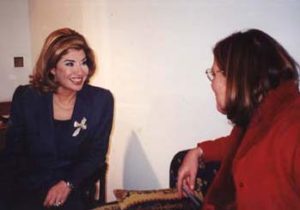Hala Sirhan is one of the Arab world's most famous television personalities. Her talk shows on ART (Arab Radio and Television) were among the most popular and controversial. Now she has taken both her popularity and her sense for the controversial to the new Dream TV network, Egypt's first privately owned satellite television operation, of which she is vice president and talk show presenter. TBS Contributing Editor Naila Hamdy spoke with Sirhan in Cairo.
Naila Hamdy: What is Dream TV all about? Can you give me a mission statement?

Hala Sirhan: The name in itself explains the concept. It is really a "dream" TV. It's a push forward for the private sector. It has been a dream for the last fifty years because, as you know, the media has been government controlled, with censorship and guidance, all the red lights and red lines, all the old fashioned classical kind of media, because it was the business of the public sector. In fact this is true not only of Egypt and the Arab world, but also of most the developing world. The media is part of the establishment. It represents the government's point of view. It produces propaganda for its politics and policies. It basically serves the leaders and the president, vice president, prime minister, minister of agriculture and so forth.
Therefore the function of media has been to serve all these people, and the time or space remaining in between programming is not primarily intended to entertain but instead is used to guide and control the minds of the masses. In essence the public sector has the power to control us and to decide what we should wear and what we should think and what we should believe. So during Egypt's socialist era everything western or capitalistic was the devil. Even though I did not believe in socialism, I had to, because the media forced me to. So you see it is a dream to have a private TV station.
Hamdy: How did the privatization of media in Egypt come about?
Sirhan: Actually it began with the print media a while back. But for broadcast media that was the "no-no" area, this was really the red line that no one could cross. We now have the opportunity to be the first Egyptian private television station—and I stress the word Egyptian, because other Arab countries such as Lebanon have many private TV stations, and there is MBC, Al-Jazeera and so forth, although I have my own opinion on whether they are truly private stations. So it is a dream to have the chance to have your own private television station, your own point of view. You can make your own decisions when it comes to what people are going to view. It is a dream because we can now apply what we believe.
Hamdy: What does Dream TV believe in?
Sirhan: Dr. Ahmed Bahgat, the chairman and owner of Dream TV, is a businessman. So he believes in privatization. Privatization equals freedom of opportunity, privatization also means freedom of expression. Therefore, if he believes in freedom then in turn our mission is to be credible, and I think the key word for the whole private media versus public sector media is credibility. If you are credible people will believe you, people will trust you, and people will come to you. You have to be honest and straightforward and we have not had that before. So the first thing we want to have is a credible station. We do not want to deceive people, we just want to tell them the truth. We want to represent the people by expressing their points of view. Dream TV is open to all types of opinions and ideologies—socialist, western, capitalist, left-wing, right-wing, fanatics and extremists. We are open to everyone. So again this our dream, to let people talk, let people be entertained, let people choose what to believe in and what not to believe in.
We believe in being credible first, and second, we believe in entertaining. Entertainment programming in the Arab region has traditionally been considered less important than other types of programming. But media is about entertainment, come on! And media is a business also. It is not only about guidance or development or whatever the government tells us it is. For so long, entertainment programming in the Middle East has been censored—do not say this word, do not mention this president, do not attack policies, do not dress in a certain way, do not have any belly dancing, do not, do not. So how can you entertain people when you are bound with all these chains?
Hamdy: Dream TV began its broadcasting this Ramadan [November 2001] with Dream 1 and Dream 2, and I've heard that Dream 3 will join the ranks. Can you explain the nature of programming on these channels?
Sirhan: Dream TV currently consists of Dream 1 and Dream 2 and we will launch Dream 3. Dream 1 has its own personality. It is entertainment for the youth, it is a young channel. It is music video clips, things about the cinema, movie stars, and celebrities, and talk shows for the young generation. It has no TV series. My target is the young generation because in Egypt—actually in the whole Arab world—the youth constitute 65 percent of the population. So Dream 1 aims to attract this segment with pure entertainment.
I'd like to give you some background on the traditional concept of entertainment. Entertainment has been for so long connected only with dancing and singing, films and movie stars. If somebody wants to present a show on TV he would say, can I read the news. Why? Because reading the news is respectable. I don't want to present a program about dancing and singing, he would say. Most people don't think that singing and dancing can constitute cultural material. They think culture is books, talking, discussions about serious things, that's what they call culture. Well that's what we have on Channel 1 of Egyptian TV.
Dream 2 is a movie channel and Dream 3 will be the variety channel; for the moment, however, we have the variety programs and the movies together on Dream 2. We have a combination of Arabic movies and English movies, but I plan to show Italian, Turkish, French, all types of quality films. So the movie channel will show both Arabic and international films. This is unusual because with both ART and Orbit the movie channels either carry Arabic films or foreign films. No one has a combination of both types on the same channel. And even if members of our audience don't speak English, they have the opportunity to see translated foreign movies. The other movie channels don't translate because they are targeting English speakers. So as I told you earlier we are about credibility and entertainment, but you can also add accessibility. We are on Nilesat as a non-encrypted, free-to-air satellite channel. We are not subscription TV, we are not pay-TV. So anyone with a Nilesat decoder can view us for free, which means we have a larger audience.
We also run TV series, both old and new, to entertain our audience. We do not have news because I believe that in order to have a news channel you must be very, very rich and the only people who can do that now are large countries, not individuals—no individual can financially support a news channel. But it is very important to have programs that analyze news events. So we plan to devote four hours a day of prime time to programs that contain political analysis, economics, sports, etc. on the Egyptian and Arab scene.
We want to talk more about the future. Our dream is to make people think of the future, not to talk about the past 7000 years, or how we built the pyramids. We want to talk about the future and how to solve the present problems to have a better future. We want to be optimistic rather than lament about our past glories. We are hoping to have these political, analytical programs to attract a different segment of the audience.
Hamdy: Where do you get your content? Will you be purchasing enough content to fill three TV channels? Are you planning to invest in the production of content? Just as an example, let's look at music video clips—are there enough produced in the Arab world to fulfill your needs?
Sirhan: There are video clips around. Video clips, whether produced here or in the West, are made with the intention of promoting the song, so music companies produce them and give them to us. We have Arabic and foreign video clips, which means there is a constant supply of new material coming to the market. This doesn't mean it's every week. Let's say you have fifteen to eighteen hours of music—that's a lot of hours, so you must get creative. You can have live concerts, you can have opera, you can use classical songs from old movies. Basically you must use a variety of resources. So we have video clips, yes, but we will not produce video clips—that's the job of the producer of the music. But we will promote concerts and then take these concerts and songs and use them. We will promote music in programs like "Al-Hawa Hawana," for example. On every show I have a singer who comes and sings three or four songs, which means I have already have four songs recorded in the studio. That's a variety of resources and very different material.
Hamdy: Is it true that you have already received some awards?
Sirhan: We have received several awards from Al-Gameya Al-Masreya and Al-Cinema W'al-Nass magazine. We got best channel, best program, and best announcer or TV host in Egypt. Then a website called Nile Cinema gave us similar results. I was best female presenter and George Kerdahi of MBC was chosen as best male presenter.
Hamdy: Are you doing any audience research?
Sirhan: Yes, we are now working with a Dubai-based company because we need to know more about Arab viewers, not just Egyptians. We are targeting the Arab audience both in the Middle East and in Europe. For the moment we are reaching Arabic-speaking audience members in Europe, and I hope that within three months we can reach America. Dream TV is an Egyptian channel; we address all the Arab people everywhere but we keep our Egyptian perspective, the way LBC for example has a Lebanese perspective.
Hamdy: Are you thinking of selling or syndicating Dream TV's successful programs?
Sirhan: Syndication is not a concept that is known in the Arab world, but it's about time it becomes known. Pierre Al-Daher of LBC contacted me offering to exchange my program with whichever program I would like from LBC to show on Dream. I was very happy about this. It's like the Oprah Winfrey show, which you can watch on many stations. Of course you can sell material to Egyptian TV, but they will draw red lines.
Hamdy: Who owns Dream TV?
Sirhan: Dr. Ahmed Bahgat.
Hamdy: Is he the sole owner?
Sirhan: Yes, and this is the question everybody asks. Actually I think he took this step too late; he should have done this years ago, because the result he is getting is amazing. It's overwhelming. This man owns the biggest development company in Egypt, Dreamland development. He has 28 factories including some that manufacture furniture, TVs, refrigerators, and marble. Which means he spends 40 million pounds [about $10 million] a year on advertising. So he got the idea of owning his own TV station where he could run his own ads. Three quarters of his annual budget for advertising could be used on his own station, with the double benefit of being able to target clients. The people who have a decoder and can watch Dream TV are his potential buyers. What's fascinating is the results of the first advertising campaign on Dream TV for real estate, compared to years of advertising on Egyptian TV that has 60 million viewers who don't necessarily have buying power. This is the first sign that this station will make money, because if we have credibility and we have good entertainment people will watch, we'll have a large audience, advertising will come. It's a business project.
Hamdy: How much money was invested in your station?
Sirhan: I am not really free to give you the exact figure.
Hamdy: What does it cost to start a station like yours?
Sirhan: You have to start with at least 20 to 30 million pounds [around half a million dollars].
Hamdy: Does the government have a share in Dream TV?
Sirhan: Yes, they have a little share. I do not have the exact figure, but the Egyptian Radio and Television Union has a share. They do not pay us money, they give us material—say, if they have a share worth two million, they will give us their share in material equaling that amount.
Hamdy: Does that allow the Egyptian Radio and Television Union to influence your content?
Sirhan: No, nobody is allowed. And their share is very small.
Hamdy: How long do you think it will take to break even or to start making a profit?
Sirhan: If you take into consideration the ads of Dr. Bahgat's companies then we're OK. I think we will make profits as of next year.
Hamdy: How do you plan to attract other advertisers, or are you not planning to?
Sirhan: Of course we are. Competitors to Dr. Bahgat are coming to us. Real estate competitors are coming to us, which is really encouraging. This is a real success story. Everybody thought that he would not allow competitors to advertise on Dream, but of course he allows competitors because he deals with the station as a business. You attract advertisers anywhere in any media if you are honest, credible, respect the mentality of your audience, give them good entertainment, don't waste their time, don't lie to them, don't deceive them.
Hamdy: Are you developing new talent, new faces?
Sirhan: All our new talent with the exception of Basma have never appeared on camera before. I insist that all the young faces on the channel should not have been on TV before because I need to mold them. I do not want them to have preconceived ideas and notions about TV. No one is allowed to say "sayedati sadati" or "ayza al-mushahideen" ["ladies and gentlemen" or "dear viewers"—standard catch-phrases on Egyptian television] on this channel. I do not want to hear this rubbish. You have to help them create their own personality. So we have our new presenters, new faces, and we have in-house training courses for them.
Hamdy: Could you tell us a bit about your professional background?
Sirhan: You'd need 15 hours for that! I started my career at Egyptian radio; many people don't know that. I began as an announcer for Egyptian radio and then I moved to Egyptian TV as an English news anchor. Then I went to the US to study, but while I was at university I worked as an Arabic language radio broadcaster for the Voice of America. I was also a correspondent for Sayedati magazine at that time. I was then offered the job of deputy editor-in-chief for the Sayedati, which I accepted. I quit TV during that time in my life, I forgot everything about radio and TV. I am really a writer, I'm not a TV person. I love my pen. It's my sixth sense.
I later moved into journalism when I came back to Cairo with my husband, Emad Ad-Deeb, and started Kul al-Nass magazine as an owner and deputy editor-in-chief. Then I left Kul al-Nass, got divorced, and started my magazine, Sayedati Sadati, where I was the editor-in-chief. Up until that moment I was in the print media, until I was approached by Sheik Saleh Kamel, who was of the owner of the magazine and who was starting ART and wanted me to be his consultant. I had no plans to go back to TV. He did not know that I had been on TV.
It all started when he asked me, "what do you think? How can we get people to watch us and pay money?" I said, "you want people to watch you and pay money, let them be a part of it, be interactive, see themselves inside the screen, let them not be passive viewers but active participants." I said the way to do that is talk shows, we have people spilling out their guts on air and we have live phone-in. This is credibility. If you sell credibility people will pay to watch you. Sheikh Saleh asked who we should get for a show like that, and I suggested Laila Rustom, because I adored her. We called her at the Tribune, but I guess she was thinking she was too old to do the show. So I said, try Nagwa Ibrahim, get somebody good. He said to me, "you understand the subject very well—why not do a couple of episodes then train someone else to take over?"
We didn't find anyone to train because no one understood the concept of the talk show. There were no talk shows on Arab TV then. So he suggested that I do the second episode. The show was a success. It was really amazing. By then I realized, and told Sheikh Saleh, that to succeed you must handle subjects that have never been touched before. Of course we have to be decent in the way we present these subjects, but we have to cross the red lines. We have to move into areas that people are not used to. This is not sensationalism, because people have accused me of sensationalism—this is honesty and straightforwardness and it is freedom. So I moved to ART and have made my name on TV.
Hamdy: How did your work as a producer at ART prepare your for your work with Dream TV?
Sirhan: I handled all the family and women's programs at ART, but actually it was easy because I had been an editor-in-chief of three magazines and I had much experience that was applicable. What I really want now is for my Dream TV to have a new screen—when you look at it you see something different, a new style, new look, language, new feel, this is what I am trying to do. And I am handling almost all the details. Dr. Bahgat is involved, and I am happy he is involved. He has very good advice. We are three people—Dr. Bahgat, Osama al-Sheikh, and myself. We decide together and there is a very good level of understanding between us. We don't need these big committees and meetings and whatever. In TV you do not need a lot of people. You know what it's like with Egyptian TV—the number of people who work there is astronomical.
Actually it's my journalistic background that has helped me the most with my work here at Dream TV. My concept with this station is that 70 percent of the presenters should be journalists, not just announcers, no matter what the subject of the program is. Whether it's fashion or movies, they must be able to go on the street and do live reports. People who work as journalists succeed in TV. So far in Egypt someone else does the research and writes a script, and a TV person just sits and someone else gives her what she is going to read. I want to abolish this. I don't care if the presenter is pretty or not as long as she has charisma and can ask intelligent questions.
 Arab Media & Society The Arab Media Hub
Arab Media & Society The Arab Media Hub




